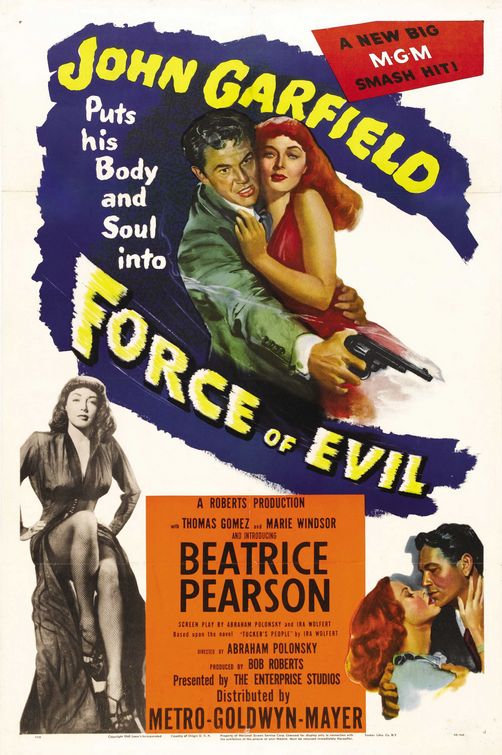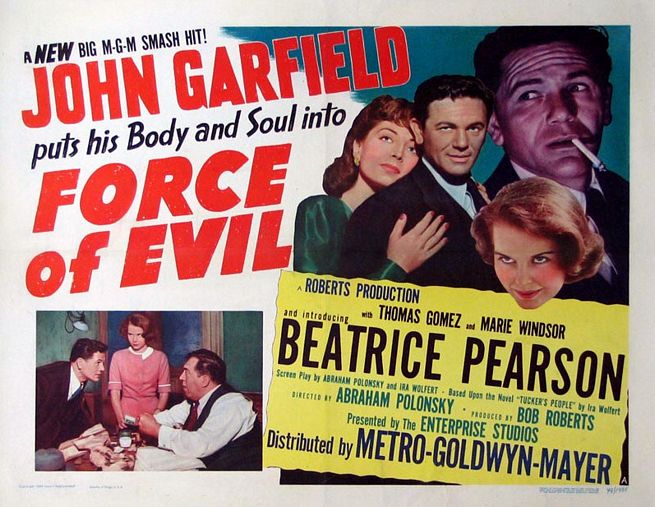
This
extraordinary film is, generically, a late-cycle crime melodrama, but
it's quirky and original enough to transcend the genre pretty
thoroughly. John Garfield plays a crooked Wall Street lawyer who
crosses the line between representing organized crime figures and
collaborating with them. Like the great Warner Brothers gangsters
of the 30s, he's a tough guy on the make who chooses a life of crime,
but he thinks it's going to be “respectable”, white-collar crime — until he's dragged
into the violence and thuggery that underpins the rackets he believes he
can manipulate.
This distinguishes him from the gangsters of the 30s, gives him a kind
of innocence, though it's innocence of a curious sort. He and a number of
the film's characters make a distinction in their minds between
“honest”, harmless criminality, mere corruption, and the “evil”
criminality of men who resort to violence. This takes us very
close to the territory of the true film noir, where all of society has lost its moral bearings, where the lines between right and wrong have been hopelessly obscured.
Abraham Polonsky, who directed and co-wrote the film, is not quite venturing into that territory, however. His outlook is more political — less concerned with moral bewilderment and confusion than with the wholesale structural corruption
of American society.
The lines between good and bad are ultimately very clear in Polonsky's universe,
and he posits off-screen forces that are gathering to fight the
corruption of the system, forces which Garfield's character will eventually decide to join.

The protagonist of a true film noir
never has this route out of his predicament. His plight has more to do with
existential uncertainty than with political or social problems in
need of practical reform. At the same time, though, Force Of Evil is
suffused with the atmosphere of a true noir,
since the forces of good are never personified dramatically — the
crusading special prosecutor Garfield finally turns to never appears on
screen.
Force Of Evil points the way to Coppola's Godfather films, which, like this one, are in the gangster tradition but with a crucial twist — they concentrate not on the
battle between good guys and bad guys but on the creeping moral decay of the bad
guys, seen from their point of view.
We don't revel in the
transgressive behavior of Garfield's character, or of Michael Corleone
in the Godfather films, as we
reveled in the transgressive behavior of Cagney's bad guys, in
confident expectation that they will be brought to justice in the end. Garfield's character in Force Of Evil,
like Michael Corleone, is punished by forces within himself and close
to home. Far from going down in a blaze of outlaw glory, he rots
from the inside, slowly. Polonsky offers Garfield's character a
way out, through social action and personal reform — Coppola, less
political, less didactic, less optimistic perhaps about American society, offers Michael Corleone nothing.

I have more than once tried to write a review of Force of Evil and given up, after finding it too hard. So my fedora off to you on a great effort!
I suppose when you are aware of Polonsky's politics, it is hard not to see the movie through the prism of social criticism. But I think you can appreciate the movie just as much as pure melodrama, and at this level Garfield is acting out the very personal drama of a man driven by a perverted ambition finally confronting the consequences of his actions and choosing a path to redemption, and this sometimes occurs in the noir universe.
Michael Corleone made a choice you can't undo in the Godfather 1 when he picked up the gun in the restaurant wash-room. Coppola goes on to explore the consequences.
You're right, of course — “Force Of Evil” can be appreciated on so many different levels. It's basically just a damned good movie!